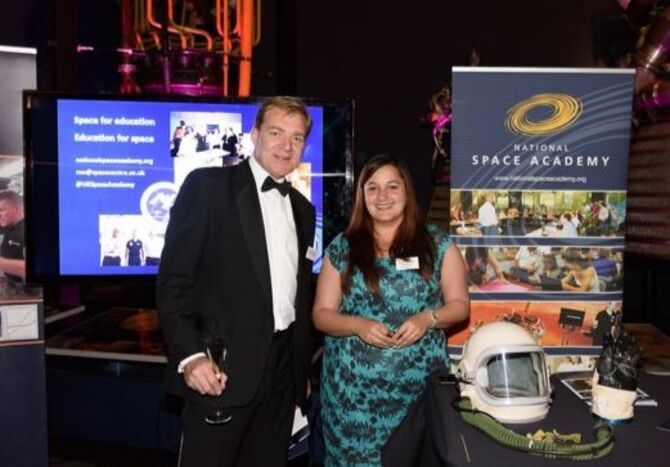Relocate Awards: Innovation Ambassadors ignite inspiration
The Relocate Awards 2017 started conversations about how mobility could work with partners, including the National Space Academy, to nurture the workforce of the future and meet evolving skills needs.

Mobility and the future
“The tenth-anniversary Relocate Awards gala event was truly stunning,” said Dr Susan Shortland, senior lecturer in HRM at the Universities of Westminster and West London, and professor emerita at London Metropolitan University.“The networking reception held in the Space Hall of the Science Museum was nothing short of awe-inspiring – not only because we were so close to the wonderful pioneering, cutting-edge exhibits that brought back so many memories of early space exploration, but also because of the quality of the STEM ambassadors inspiring us about various aspects of science, technology, maths and engineering and their relevance to the development of young people, careers and mobility.“Technology is absolutely critical to the development of knowledge, skills and capabilities for our future economy and contribution on the world stage. The Relocate Awards celebrated the interrelationships between mobility and science and technology in real style; it was a unique event celebrating the amazing journey that relocation has been on over the past decade and paving the way for the future of our industry.”Space is the place?
The evening’s overarching theme of innovation has rarely been more relevant. Technology is changing the shape of work, societies, and the frontiers of what is possible, at an extraordinary pace. This is having broad impacts on our sector. Professor Stephen Hawking has reportedly suggested that we need to think seriously about preparing to relocate from Earth to colonise other planets in 100 years’ time or face extinction.While it might be fanciful, for the time being, for mobility to think about its role in relocating people to space, Professor Hawking’s comment does give food for thought. It encourages mobility to think about sectors at the technological – and geographic – frontiers and familiar challenges – for example, skills and talent gaps – in a different way.More Relocate Awards 2017 news:
Global careers of the future
The Innovation Ambassadors from the National Space Academy, a UK and international programme with its headquarters in Leicester, offered guests an insight into how STEM subjects in schools, universities and colleges were being promoted. It also prompted guests to think about the legacy that mobility, as individuals, companies and a sector, could hand on to the next generation of mobile employees.Professor Anu Ojha, OBE, Director of the National Space Academy, and his colleagues, Dr Kierann Shah, General Manager, and Amy Bradshaw, Gulf and Special Projects Coordinator, together with students Mansi Joshi and Ryan Mawby, inspired guests to think about global careers of the future and the skills businesses need today.They also offered a perspective on how we can encourage young people to aim high and take their place in a fast-paced global environment. The National Space Academy is a not-for-profit organisation that works with industry, academia, and secondary, further and higher education to provide pathways into the UK’s thriving space-sector careers. This partnership exemplifies the close collaborations between education, business and the STEM sector that are helping to develop understanding, supply skills, and foster innovation, to economic and social benefit.“As well as inspiring students with space education in the classroom through our network of 25 outstanding teachers across the UK, we are now looking at taking this model internationally,” explained Amy Bradshaw. “We have two very successful student and teacher masterclass deliveries in China and the United Arab Emirates, increasing space knowledge not only here in the UK but also across the waters to our future generations.”The programme is inspiring and equipping a new generation of scientists and engineers like Mansi Joshi and Ryan Mawby, who recalled that once they “didn’t think it was possible” to achieve the ambition of training to work as a space engineer. Now they know it is a real possibility. “The space industry is huge in the UK,” said Mansi Joshi, a former student of the National Space Academy’s Space Engineering course. “I can really see where the training will take me in a job.”How can mobility help?
The shared experiences here showed huge ambition, collaboration, and will to face the challenges of tomorrow’s workplace head-on today.Relocate Global’s aim is to continue the conversations started in the surroundings of the Science Museum and inspire the Relocate worldwide community to:- Innovate and be creative in both their personal and work lives
- Imagine the workforce of the future and how different industry sectors will evolve to meet future challenges and developments
- Help connect employers with schools and the talent of the future
- Raise awareness of the importance of global mobility in supporting business growth and recruiting and retaining talent.
©2025 Re:locate magazine, published by Profile Locations, Spray Hill, Hastings Road, Lamberhurst, Kent TN3 8JB. All rights reserved. This publication (or any part thereof) may not be reproduced in any form without the prior written permission of Profile Locations. Profile Locations accepts no liability for the accuracy of the contents or any opinions expressed herein.




































